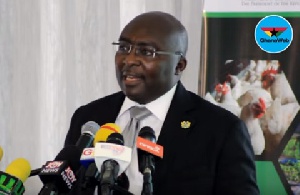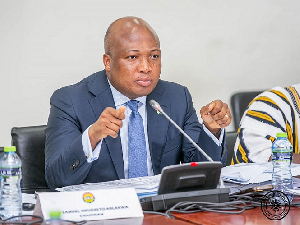Vice-President, Dr. Mahamudu Bawumia has said government will in the coming year follow through with their plans of introducing digital registration of lands, an initiative intended to develop the mortgage market.
“One of the big things we are going to be doing next year is, we are shifting our focus to land and land registration. This is a real bay of the banking industry and the financial services industry,” he said.
“We have to turn our focus to the land registry and the process of land little. I think this is the next face of digitalization that is about to happen and we are tackling that next year because we believe that by the end of next year all our land records should be digital,” he added.
Dr. Bawumia who expressed great worry at the level of mortgage to income ratio in the country compared that of the United States of America (USA) to Ghana’s and said Ghana being a developing country had the highest in the world and the USA being a developed nation was one of the lowest globally.
Describing mortgages as “very key ways of raising financing”, the vice president noted that developing the nation’s mortgage market was reliant on the efficiency of allocating titles to land, a process he said would be efficacious when digitalized.
Dr. Bawumia explained that having an effective land digitization system not only assures growth in the mortgage market but increase growth in the banking and financial services sector, areas which directly affect the growth of the economy.
“We believe that if we digitize all our land records the process of interrogating title and registering title will be much simpler. We believe that if that happens, these are some of the unwritten rules, it strengthens the banking sector indirectly.
He mentioned the security issues associated with the inability to authenticate property owners when properties are used as collateral for bank loans and stressed that problems of this kind are the reason for the introduction of the digitized land registration system.
Dr. Bawumia said government acknowledged that, the country needed to remain competitive in the global market and so introduced some basic developmental programmes including the, National Identification System, the paperless ports project, digitisation of the Driver and Vehicle Licensing Authority, the e-procurement processes, the National Property Addressing System as well as the digitisation of some state institutions, to decrease corruption, promote financial inclusion and transparency.
He made these revelations, speaking on the theme, ‘Building a Robust and Sustainable Banking System in Ghana’ at the 21st National Banking Conference of the Chartered Institute of Bankers in Accra.
“We need to have the soft infrastructure to support the banking industry and this is what is driving the national ID card, digital addressing system and other digital programmes so that we can trace customers, build a robust referencing regime and these will be fundamental in reducing interest rate and strengthening the stability of the banking system,” he said.
The prestige that comes with owning a land in the country has caused several to want to own one.
The problems that many landowners face from buying a land with risks of being defrauded, to registering it has over the years pushed successive governments to make the land title registration process less stressful.
The days when landowners outside Accra, had to travel to and from the capital till the registration process was completed, where halted when the Land Administration Project (LAP) started in 2003, was effected.
The LAP project was basically coordinate land registration processes, decentralize the processes and use laws that govern land administration in the country.
The digital land title registration system which is part of government’s digital Ghana agenda is expected to speed up service delivery and block opportunities for corruption in the land administration process.
The upcoming digital system, Ghana Enterprise Land Information (GELIS) associated with the digital land title registration which is designed to cut delays and check fowl play during the registration process.
This is expected to reduce the number of days till land title registration is done from about two and a half months to about 30 days.
Ghana currently has two systems of land registration in Ghana, namely the Land Deeds Registration (LDR) System and the Land Title Registration (LTR) System.
The lands commission is mandated by law to register lands in Ghana.
Click to view details



Business News of Tuesday, 28 November 2017
Source: www.ghanaweb.com
Digital land title registration scheduled for 2018 – Bawumia
Entertainment
















